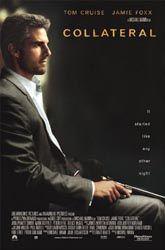 Director:
Michael Mann
Starring:
Jamie Foxx
Tom Cruise
Jada Pinkett Smith
Mark Ruffalo
Peter Berg
Bruce McGill
Release: 6 Aug. 04
IMDb
|
Collateral 
BY: DAVID PERRY
In the twelfth year in his ďtemporaryĒ job as a Los Angeles
cabbie, Max (Foxx) begins his graveyard shift carting a beautiful young
lawyer (Smith) to her office. Their conversation, segueing from the normal
directional orders of a cab rider to the compelling banter of two people
likely destined for each other, feels absurd for a Michael Mann film -- the
images are mighty pretty, but the substance has lost the ultra cool flash of
his best work, from Miami Vice to The Insider. Collateral, we
soon learn, is
about taking risks, even if the possibility of a truer meaning to a Mann
film beyond vague pomp and circumstance is dashed after Max drops his
customer at her destination.
Collateral is, without a doubt, that cold, indifferent Mann film that weíve
come to expect, which isnít to say that itís bad. Even when his films almost
become kitschy in their adherence to technical showboating, I find the
industrial service from Mann and his cohorts truly mesmerizing. Heís the
best filmmaker to glaze over substance in return for the pure pleasures of
24-exquisite-frames-per-second of cinematic genius.
This is certainly one of his best examples of the simplicity he can impart
in the complexities of his shots. Modern Los Angeles has never looked better
(I anxiously await Thom Andersenís reaction), but the characters and their
plight take the weight of objets díart: trinkets in a larger
collection, unable to stand alone. Each frame could be put on a wall at the
Guggenheim, and the art intelligentsia would be gaga over the density of
images, the balance and contrast between figure and setting. Their imagined
themes, though, would probably be more interesting than whatís actually
being projected in movie houses playing Collateral.
But even half-assed Mann storytelling is brilliantly compelling moviegoing.
The artistry of the filmís first two-thirds, beyond the images, is clearly
represented in his complex editing and sound schemes. The series of
situations Max falls into after picking up a hit man (Cruise, in a showily
restrained performance, his pretty-boy smile getting more attention by not
appearing than he gets in his usual toothy performances), have a pace that
keeps the audience from ever stopping to consider the inanity of it all.
At least, thatís the case until the filmís final section, a haphazardly
arranged collection of action sequences that change character arcs and
create only flashes of tension (where the rest of Mannís slight-of-hand
keeps the audience enthralled). Itís in these moments that Mann suddenly
turns into Jan de Bont, the only filmmaker more obvious than himself.
No matter how blatant he may become, itís impossible to
truly fault him for trying this: after convincing people like me of his
talents by giving us little more than his methodological abilities, whoís to
say he cannot hint at what a bad Michael Mann film would look like without
still pushing us to write gushing reviews about how heís Godís gift to
cinematography?
 |

